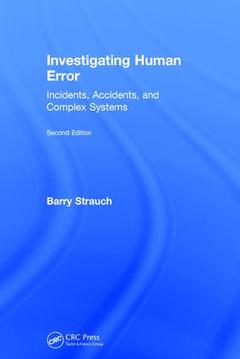Investigating Human Error (2nd Ed.) Incidents, Accidents, and Complex Systems, Second Edition
Auteur : Strauch Barry

Preface; Introduction; Part I Errors and Complex Systems; Errors, Complex Systems, Accidents, and Investigations; Analyzing the Data; Equipment; Part II: Antecedents; The Operator; The Company; The regulator; Culture; Operator Teams; Part III: Sources of Data; Electronic Data; Interviews; Written Documentation; Part IV: Issues; Maintenance and Inspection; Situation Awareness and Decision Making; Automation; Case Study; Final Thoughts; References
Date de parution : 03-2017
15.6x23.4 cm
Disponible chez l'éditeur (délai d'approvisionnement : 14 jours).
Prix indicatif 123,79 €
Ajouter au panierDate de parution : 02-2017
15.6x23.4 cm
Thème d’Investigating Human Error :
Mots-clés :
Operator Error; national; Accident Investigations; transportation; Federal Aviation Administration; safety; Situation Awareness; board; Descent Rate; investigator; Investigative Logic; federal; Aural Alerts; aviation; Lose Situation Awareness; administration; Airplane’s Airspeed; situation; Safety Culture; awareness; Error Investigators; Flight Data Recorders; Affect Operator Performance; Work Habits; International Civil Aviation Organization; Company Antecedents; Operator Antecedents; Uncertainty Avoidance; Voyage Data Recorders; Stick Shaker; Maintenance Environment; FAA; Violate; Aerodynamic Stall; Pilot Flying



